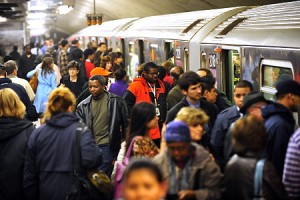You can check out Part 1 of this series here.
In many ways, the challenges I will discuss in this series are issues that most church planters/pastors face in any context.
Living in NYC simply exacerbates some of these challenges (for instance the disproportionate cost of living here, as mentioned in Part 1).
For instance, when it comes to the financial pressures of any start-up, these anxieties exist for any entrepreneurial endeavor.
However, the pure financial costs are higher here, simply put.
One could talk about the “greater risk, greater reward” mantra to describe the merits of planting a church in NYC… but it’s exceptionally difficult to quantify the great “reward” of planting a church in NYC vs another city/context when ministry “success” entails so many different elements.
If one were to speak purely of numbers of people when it comes to church “success”, there are significantly larger churches and church plants around the country, a fact that can easily cloud the merits of investing significantly more money to plant a church here rather than say, South America.
But I digress…. (although you’ll see how church size will come up later in the post).
The next challenge I wish to write about is one that is ubiquitous regardless of context… and yet there are some peculiarities to NYC.
Here’s Challenge #2: Planting a Church in NYC is Awfully Lonely.
Non-profit management guru Peter Drucker once said that the four most challenging jobs in the US are the President of the US, the CEO/President of a Hospital, a University President, and a Pastor.
It’s already hard enough being a Pastor and navigating the different “hats” one has to wear (which, along with the other 3 vocations Drucker mentions, is why being a Pastor can be one of the most challenging jobs), but adding the element of being an entrepreneurial Pastor can make the task of Church Planting profoundly more difficult and complicated.
Both Pastor and Entrepreneur are inherently stressful positions, and adding NYC to the equation makes for a particularly combustible context.
I believe this to be true of most pastors/church planters I meet in NYC, but what makes the feeling of loneliness more acute here is the feeling that I’m never quite measuring up.
This goes back to the discussion about measuring ministry “success.”
If one were to go purely based on Sunday attendance (which is generally the standard measurement across time/place in church planting in the States – as much as people would hate to admit), then “success'” is difficult to come by in NYC when compared to one’s previous context (usually a mega-ish church in the suburbs of middle America) or even in the shadows of more established churches in the City (so many great, longstanding churches to name).
The above paragraph reveals even more nefarious messages that I often tell myself as a church planter – I’m measured against other Pastors/Churches.
All in all, the stress of financial worry, family adjustments, and the inescapable cloud of comparisons to peers or my past can lead me to isolate myself from feeling what is reality to so many of us:
Church Planting in NYC is financially taxing, a stress on my family, and not quite as glamorous as the big city itself.
Yes, I’ve been there.
I suspect most of us have.
Solutions?
Thankfully, the above news is something that many have reflected on before, and as a result, ministry heroes of mine have tried hard to keep Pastors/Church Planters in NYC from isolating and growing cynical.
Here are a few folks I’d like to highlight:
1) Redeemer City to City & NYC Leadership Center – I link these ministries together not because of any official connection but because these organizations have long been advocates of resourcing and connecting church planters for decades now.
I’ve written about the spirit of leaders like Tim Keller and Mac Pier before, and I truly think these guys have been forerunners to much of the camaraderie and friendship enjoyed by Pastors in NYC today.
Also, shout-out to Parakeleo, a ministry of mutual support for church planting spouses that I’ve heard great things about.
2) Emotionally Healthy Spirituality – I can’t emphasize this one enough. My heritage obviously comes from New Life Fellowship, so it’s no surprise that I want to advocate for every pastor to learn from Pete & Geri Scazzero and Rich Villodas in living an emotionally healthy life that allows my marriage and family to flourish. Church planters especially can use a healthy dose of EHS.
3) Christ Tabernacle – Ever since I’ve known the CT guys, I’ve been amazed at their hospitality and willingness to serve/connect church leaders in NYC. Pastor Michael Durso is part of that wave mentioned above, and Adam Durso and the rest of CT are some of the most generous folks I know.
4) Recovery House of Worship, Trinity Grace Church & “Network” Church Planting – I LOVE the RHOW folks. They are a church planting movement doing amazing work in the city and beyond, and are some of the most mission-minded church planters I know. I learn so much from them about mission and discipleship whenever I’m around them!
TGC is another family of parishes all around NYC. Their kingdom vision is really genuine and inspiring, and the ways they plant churches by 1) empowering/contextualizing and 2) serving with a Central Office is something that many church plants and churches have learned a great deal from (including Hope).
I LOVE how these folks fight against the isolationist spirit of church planters by creating a network of mutual support.
Brilliant.
And helpful.
5) So many Pastors/Church Planters in NYC who now embody the Kingdom Spirit – Reach out to any of us. I think you’ll realize we’ll share the following:
– Church Planting is Hard in NYC
– Church Planting is Rewarding in NYC
– The City is Too Big to be Thinking So Small
– I Don’t Have to Do This Alone
– I Desperately Need a Gospel-Centered Approach to My Identity, Our Church, and Our City.
Together – and only together – can we be part of something significant in this Great City.



 As someone who has lived in NYC since 2001 (and first visited Redeemer in 2000), it’s been really cool to get a first-hand look at how Redeemer has impacted our city and world for 13 of those 25 years.
As someone who has lived in NYC since 2001 (and first visited Redeemer in 2000), it’s been really cool to get a first-hand look at how Redeemer has impacted our city and world for 13 of those 25 years.
